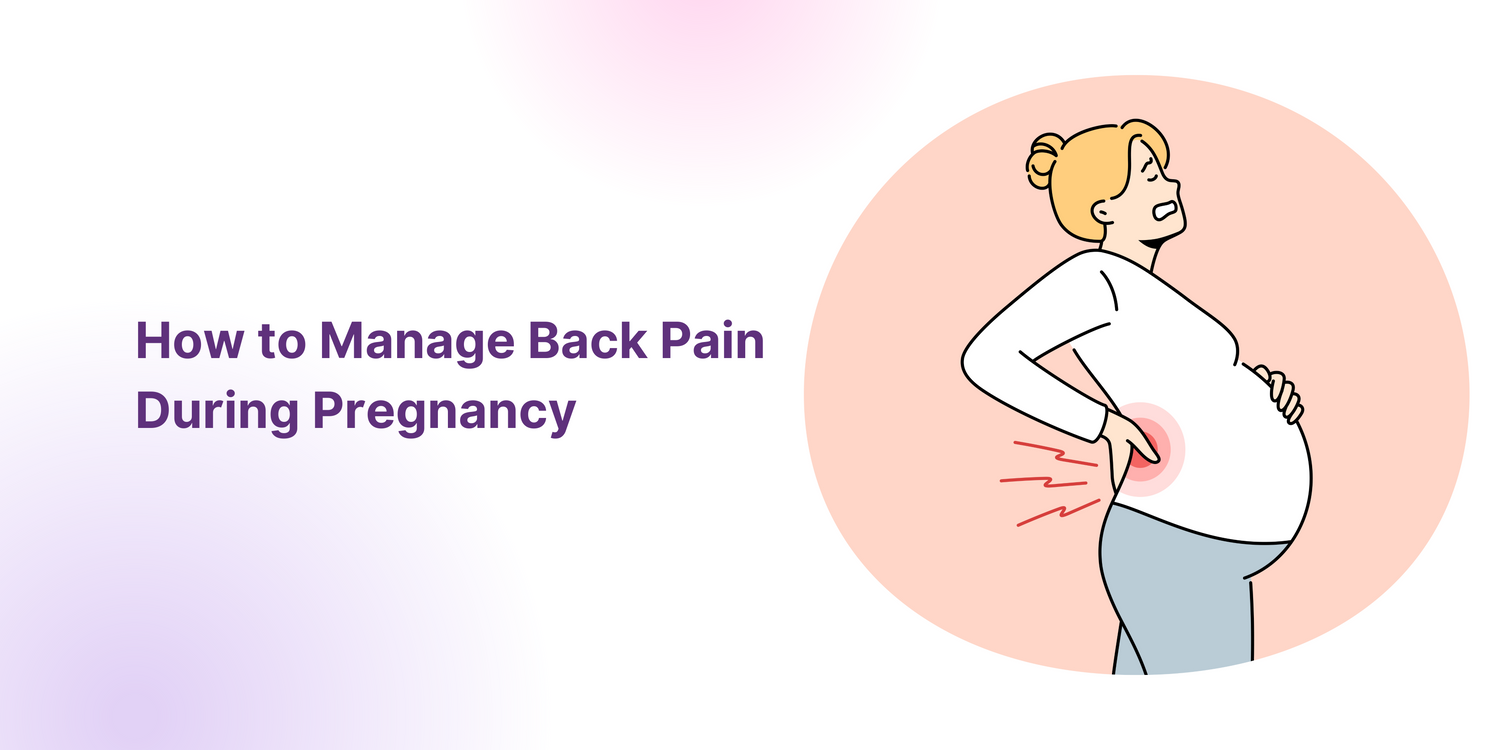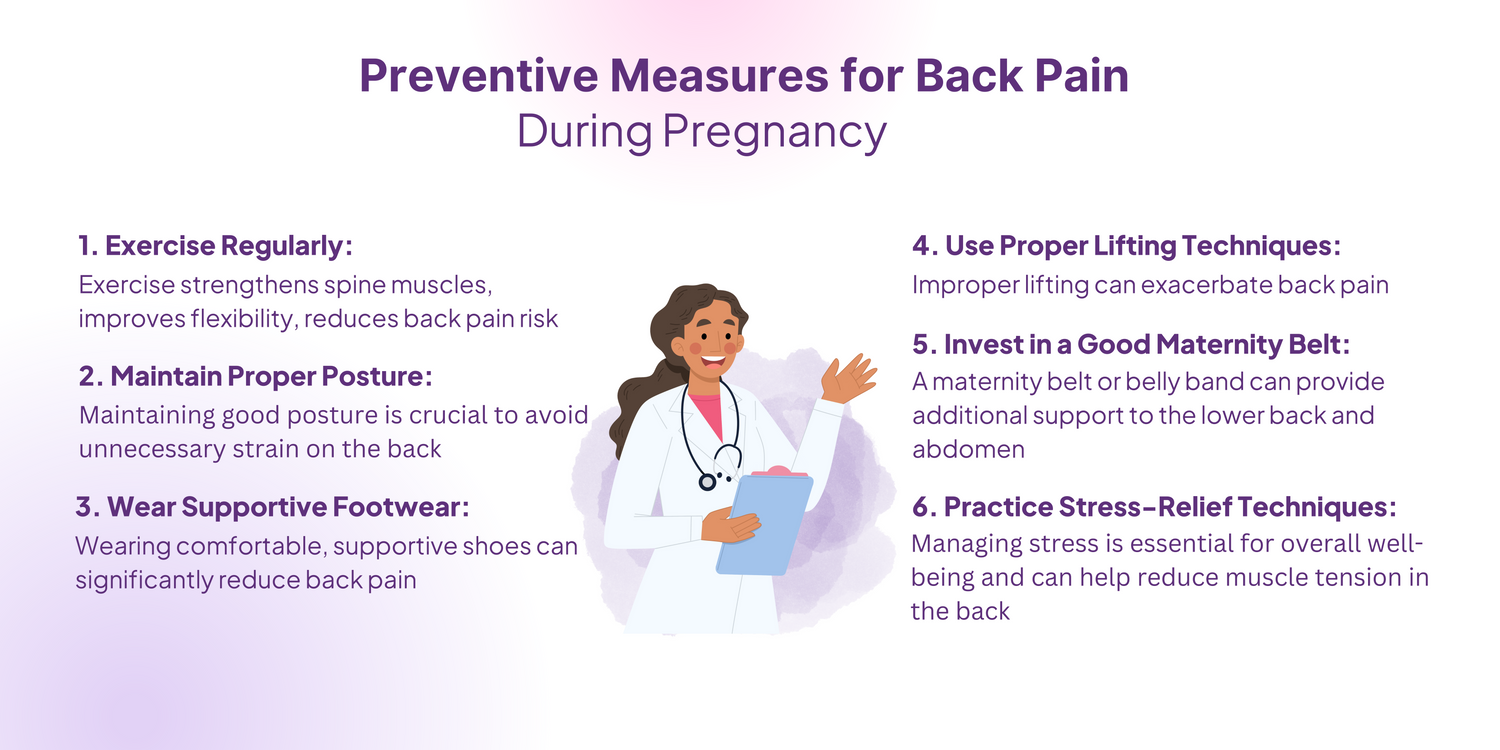How to Manage Back Pain During Pregnancy?
Aug 4 • 7 min read

Table of Content
Hey, Mom-to-be! If back pain is cramping your style, fret not! We've got your back (literally) with some fantastic tips to ease your discomfort. This blog is made just for you because you deserve all the support and relief you need as you navigate this amazing journey.
We understand that back pain can throw a wrench in your excitement as your body works hard to support your growing little one. But do not worry, you are not alone in this.
Understanding the causes, preventive measures, and effective treatments for back pain during pregnancy is essential for maintaining comfort and well-being throughout this special time.
Understanding the Causes of Back Pain During Pregnancy
Back pain during pregnancy is multifaceted, often resulting from a combination of physiological and hormonal changes. Here are the primary factors contributing to back pain during this period:
1. Hormonal Changes
One of the first changes during pregnancy is an increase in hormone production, particularly relaxin. Relaxin helps the body prepare for childbirth by loosening ligaments in the pelvic area and softening the cervix. However, this hormone also affects other ligaments and joints, decreasing stability and increasing the risk of back pain.
2. Weight Gain
As the baby grows, the mother's weight increases significantly. This additional weight puts extra pressure on the spine and back muscles, often leading to discomfort and pain. The average weight gain during pregnancy ranges from 25 to 35 pounds, with much of this weight concentrated in the abdominal area, further straining the back.
3. Postural Changes
Pregnancy shifts the body's centre of gravity forward. To accommodate this alteration, many women alter their posture, frequently arching their back and tilting their pelvis. These postural adjustments can cause muscle strain and contribute to back pain.
4. Muscle Separation
As the uterus expands, it can cause the rectus abdominal muscles (the "six-pack" muscles) to separate along the centre seam, a condition known as diastasis recti. This separation can weaken the abdominal muscles, reducing support for the back and leading to pain.
5. Stress
Emotional stress can induce muscle tension in the back, resulting in pain. Pregnancy is often a time of increased emotional stress due to concerns about childbirth, parenting, and life changes.
Preventive Measures for Back Pain During Pregnancy

While back pain during pregnancy is common, several preventive measures can help minimise discomfort and maintain a healthy spine. Here are some practical tips:
1. Exercise Regularly
Regular exercise can help strengthen the muscles supporting the spine, improve flexibility, and reduce the risk of back pain. Exercises like swimming, walking, and yoga are especially good for expectant mothers. Always speak with your doctor before beginning any workout routine while pregnant.
Recommended Exercises:
Walking: Low-impact and helps improve cardiovascular health.
Swimming: Provides a full-body workout without placing strain on the joints.
Prenatal Yoga: Enhances flexibility, strength, and relaxation.
Pelvic Tilts: Strengthen abdominal muscles and reduce back strain.
2. Maintain Proper Posture
Maintaining good posture is crucial to avoid unnecessary strain on the back. Here are some tips for proper posture during pregnancy:
Standing: Keep the shoulders back, and chest lifted, and avoid locking the knees. Use a wide stance for better support.
Sitting: Choose chairs with good lumbar support. Use a small pillow behind the lower back if needed.
Sleeping: Sleep on your side with a pillow between your knees to reduce stress on the back.
3. Wear Supportive Footwear
Wearing comfortable, supportive shoes can significantly reduce back pain. Avoid high heels and opt for low-heeled shoes with good arch support. Orthotic inserts can also be beneficial for additional support.
4. Use Proper Lifting Techniques
Improper lifting can exacerbate back pain. When lifting objects, bend at the knees, keep the back straight, and use the legs to lift rather than the back. Avoid lifting heavy objects whenever possible.
5. Invest in a Good Maternity Belt
A maternity belt or belly band can provide additional support to the lower back and abdomen. These belts help distribute weight more evenly and can alleviate some of the pressure on the back.
6. Practice Stress-Relief Techniques
Managing stress is essential for overall well-being and can help reduce muscle tension in the back. Techniques such as deep breathing exercises, meditation, and prenatal massage can be highly effective.
Effective Treatments for Back Pain During Pregnancy
Despite preventive measures, some level of back pain may still occur. Fortunately, several treatment options can help manage and alleviate discomfort:
1. Physical Therapy
Physical therapy can be highly beneficial for addressing back pain during pregnancy. A physical therapist can design a personalised exercise programme to strengthen core muscles, improve posture, and reduce pain. Techniques such as manual therapy and stretching exercises can also be incorporated.
2. Prenatal Massage
Prenatal massage, performed by a certified therapist, can provide relief from muscle tension and pain. Massage therapy can improve circulation, reduce stress, and promote relaxation. It's essential to choose a therapist experienced in prenatal massage techniques.
3. Acupuncture
Acupuncture is a traditional Chinese medicinal method in which tiny needles are inserted into particular spots on the body. This technique can help balance the body's energy and alleviate pain. Some studies suggest that acupuncture can be effective in reducing back pain during pregnancy.
4. Chiropractic Care
Chiropractic care focuses on maintaining proper spinal alignment. A chiropractor trained in prenatal care can perform gentle adjustments to alleviate back pain and improve spinal function. Always consult with a healthcare provider before seeking chiropractic treatment during pregnancy.
5. Hot and Cold Therapy
A temporary solution for back pain is to apply cold or heat to the afflicted area. Try a warm compress or heating pad for 15-20 minutes to calm the muscles. Alternatively, a cold pack can help reduce inflammation and numb pain.
6. Over-the-Counter Pain Relief
Some over-the-counter pain relief options, such as acetaminophen, may be safe during pregnancy. However, it is critical to check with a healthcare expert before taking any medication to confirm that it is safe for both mother and child.
7. Supportive Pillows
Using supportive pillows while sleeping or resting can help alleviate back pain. Pregnancy pillows, designed to support the body, can be particularly useful. Placing a pillow between the knees and another under the abdomen can reduce strain on the back.
Lifestyle Adjustments for Managing Back Pain
In addition to preventive measures and treatments, certain lifestyle adjustments can help manage and reduce back pain during pregnancy:
1. Maintain a Healthy Weight
Gaining appropriate weight during pregnancy can help reduce strain on the back. Follow a balanced diet rich in essential nutrients to support both the mother and the growing baby.
2. Stay Hydrated
Proper hydration is essential for overall health and can help maintain muscle function. Aim to drink plenty of water throughout the day to stay hydrated.
3. Get Adequate Rest
Rest is crucial for a healthy pregnancy and can help reduce back pain. Ensure you get enough sleep each night and take breaks during the day to rest and relax.
4. Practice Good Ergonomics
Whether working at a desk or performing daily activities, practising good ergonomics can help reduce back strain. Adjust the height of workstations, use supportive chairs, and take frequent breaks to move and stretch.
5. Avoid Prolonged Standing or Sitting
Prolonged standing or sitting can exacerbate back pain. Throughout the day, sit and stand alternately. To relieve strain on the lower back, use a footrest while sitting.
When to Seek Medical Attention?
While back pain during pregnancy is common, certain symptoms may indicate a more serious condition requiring medical attention. Consult with a healthcare provider if you experience:
Severe or persistent back pain
Pain that radiates down the legs
Numbness or tingling in the extremities
Difficulty walking or maintaining balance
Fever or chills accompanying back pain
Pain that does not improve with rest or treatment
Conclusion
Back pain during pregnancy is a common but manageable condition. Understanding the causes, implementing preventive measures, and exploring effective treatments can help alleviate discomfort and improve overall well-being.
Each pregnancy is unique, and it's essential to consult healthcare providers to develop a personalised plan for managing back pain. Expectant mothers can enjoy a more comfortable and healthy pregnancy journey by being proactive and making wise decisions.
FAQs:
Q: What exercises are safe for managing back pain during pregnancy?
A: Low-impact exercises such as walking, swimming, prenatal yoga, and pelvic tilts are safe for managing back pain during pregnancy.
Q: Can I use over-the-counter medications for back pain during pregnancy?
A: Always consult with a healthcare provider before taking any medication while pregnant to make sure it's safe for both the mother and the baby.
Q: Is chiropractic care safe during pregnancy?
A: Chiropractic care can be safe when performed by a professional trained in prenatal care. However, always consult with a healthcare provider before seeking chiropractic treatment during pregnancy.